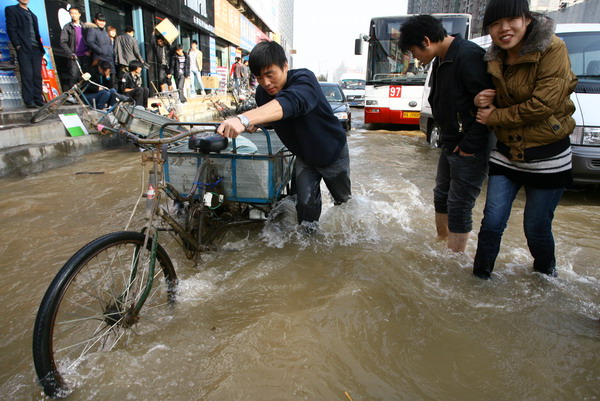Burst pipes a sign of aging infrastructure
The second burst water pipe in Zhengzhou in a week has exposed the hidden problems of decades-old underground infrastructure in many cities across the country, experts have said.
In the second incident, the water supply for a million residents in the capital city of Central China's Henan province resumed on Tuesday morning, less than a day after a burst pipe forced a water plant to halt operations.
A major pipe of the Zhongfayuanshui water plant burst at 1:07 pm on Monday in northern Zhengzhou, leading to the closing down of the water pump and the cutting off of supply in the northern part of the city, according to a statement from the Zhengzhou Water Supply Corporation.
By Tuesday noon, water supplies had resumed in most parts of the city, except for a residential area of about 200 households, where the broken main was located.
A local resident surnamed Zhao, whose home still had no tap water running on Tuesday, said she had no idea when the supply would resume.
"There is still no water at home. I slept in a hotel last night. Tonight I'm staying at my husband's office," she said, adding that she and her neighbors were asked to evacuate their homes on Monday night.
The corporation said the interruption of supply was mainly due to the aging water pipe and the change of season.
"The broken main is more than 30 years old and is deteriorating. Besides, winter is coming and the increased temperature differences between day and night mean that the mains and pipes are liable to burst," the statement said.
The corporation also cited the rapid growth of the local population and the addition of many tall buildings as factors leading to strains on infrastructure through overuse.
The first incident occurred on Nov 17, when a water main near the Shiyuan water plant, the city's largest, burst, damaging a 10-meter section of the pipeline and temporarily cutting off water supply for 800,000 residents in the west of the city.
According to data from the Zhengzhou Water Supply Corporation, the complete water supply pipeline in the city is more than 2,400 km long.
During the past five years, the city government has spent 40 million yuan ($6 million) annually in improving the system. By this year, it had upgraded 300 km of pipelines.
Jiang Zhongguang, a professor at Beijing University of Civil Engineering and Architecture, said that many cities in China, especially the old ones, share the same problem with Zhengzhou.
Figures from the Ministry of Housing and Urban-Rural Development show that in 2006 about 37 percent of all city water pipes across the country were aging noticeably. Many of them were laid more than 50 years ago.
"Basic facilities, especially those under the ground such as water and gas pipes, affect the life and safety of everyone. Their maintenance deserves high attention," Jiang said.
He said problems can occur easily when the infrastructure in old cities become exhausted, or when infrastructure in new cities is badly planned or built by unqualified tradesmen.
"Avoiding jerry-building, improving the testing of underground constructions and encouraging responsibility will be key factors in the future, whether in building a new city or maintaining an old one," he said.
Fan Yaobang, a Beijing-based senior city planner, said effective coordination during city infrastructure development is also important.
"The main problems with this incident cannot be completely attributed to city planning, because construction and management processes were also factors," he said.
"When the city was being built, there was not strong enough coordination between different departments."
 0
0 







